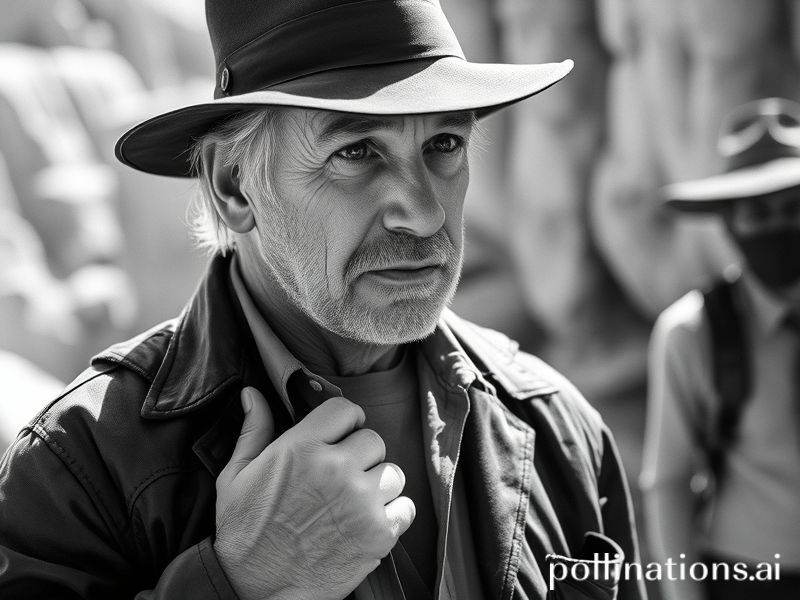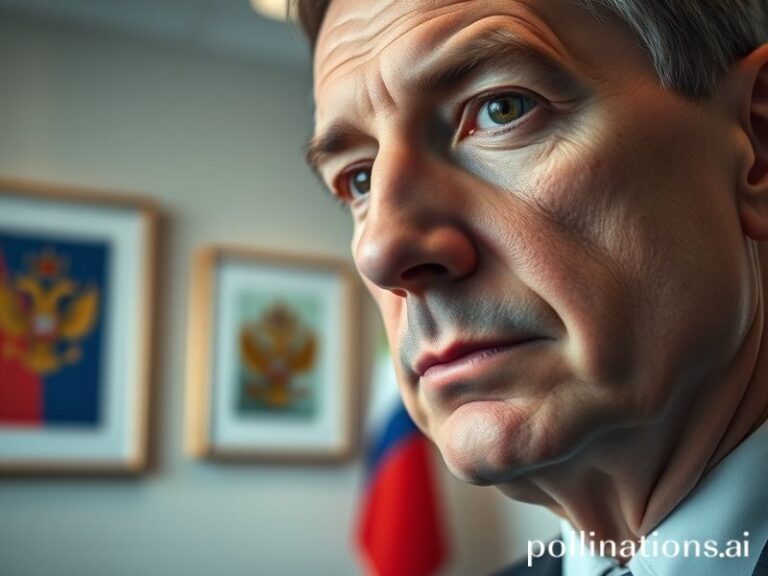Harrison Ford: Global Icon, Reluctant Climate Cop, and the Last Market-Stabilizing Smirk
Harrison Ford: The Last American Action Figure Standing Between Us and Planetary Meltdown
By the time you finish this sentence, another streaming algorithm will have recommended Indiana Jones to a teenager in Jakarta who’s wondering why the archaeologist doesn’t just use Google Maps. Such is the global afterlife of Harrison Ford: a man whose face has become the de-facto screensaver for late-stage capitalism’s nostalgia binge. From Ulaanbaatar bootleg-DVD stalls to Parisian art-house retrospectives, Ford’s squint is more universally recognized than the Geneva Conventions—and, judging by current headlines, considerably more effective.
Let’s zoom out. While diplomats in windowless rooms trade carbon quotas like Pokémon cards, Ford keeps showing up at COP summits in his tiny carbon-neutral jet to scold them. The irony is artisanal: the same guy who once vaporized a Nazi airfield with nothing but a smirk now lectures finance ministers about methane leakage. Yet somehow the stunt works. When Ford growls “get off my plane” these days, he’s talking to world leaders about fossil-fuel subsidies, and the memes still slap in seventeen languages.
The international reverberations are measurable. Each time Ford reprises a role—be it Han Solo, Indy, or that gruff dystopian cop who really should’ve unionized—global toy supply chains convulse. Factories in Shenzhen pivot from rice cookers to Millennium Falcon drones; Peruvian silver miners work overtime for limited-edition bullwhip buckles. Economists at the IMF quietly track “Ford Fluctuations” the way ornithologists monitor Arctic terns. A single cameo in a Marvel post-credits scene could nudge the Chilean peso. We are, it seems, one Blade Runner sequel away from sovereign default in Latvia.
Meanwhile, the man himself appears bemused by his own omnipresence. In a recent interview with Argentina’s Clarín—conducted while he piloted his helicopter to a wildfire he felt like personally extinguishing—Ford admitted he’s lost count of how many languages his scowl has been subtitled in. “I just show up and try not to hit the scenery,” he shrugged, inadvertently summarizing U.S. foreign policy since 1945.
Critics argue Ford’s late-career activism is merely brand extension, another chapter in the endless franchise reboot of American soft power. They’re not wrong. When he parachutes into Glasgow to wag a finger at Jair Bolsonaro, the spectacle feels scripted by Disney’s PR department—complete with moody lighting and a swelling orchestral reminder that This Land Is Your Land (royalties to BMG). Still, the alternative is watching actual politicians debate whether water should be wet, so cynicism feels petty.
Across three continents, I’ve witnessed the Ford Effect firsthand. In Nairobi, matatu drivers airbrush his face onto minivans because “he looks like a man who pays his debts.” In Warsaw, a dissident theater troupe performs an avant-garde Hamlet starring Ford as both ghost and procrastinating prince—audiences weep, though it’s unclear if for Denmark or democracy. Even in Tehran, where Western icons are usually Photoshopped into oblivion, bootleg posters of a young Ford adorn dorm rooms like secular saints, proof that smirking anti-authoritarianism ages well under sanctions.
Of course, no empire lasts forever. Ford’s knees now creak louder than the Millennium Falcon’s hyperdrive, and Disney’s de-aging software can only do so much before it slips into uncanny-valley necromancy. Yet each time we assume the curtain is falling—remember 2008, when Hollywood briefly mistook Shia LaBeouf for a franchise lifeboat?—Ford materializes atop a glacier, machete in hand, reminding us that archetypes don’t retire; they just switch streaming platforms.
Conclusion? In an era when borders harden and the planet softens, Harrison Ford remains our most durable export: a rugged avatar of American mythology that still plays in 4K from Reykjavík to Riyadh. He’s the human equivalent of a Swiss Army knife—part cowboy, part codger, part climate nag—folded into the back pocket of a world that can’t decide whether to applaud or sue him. And until the oceans finish their hostile takeover, he’ll keep circling back, like every sequel we claim we didn’t ask for but secretly need: proof that someone, somewhere, still knows how to land the plane—even if it’s currently on fire.







